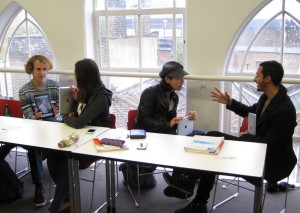More sector-led approaches have been championed by leading language school chain, EF. They run career-focused Special Interest Courses – or SPINs – that cover a host of skills, including; public speaking and negotiation, and specific industry courses covering IT, tourism and the entertainment industry. EF also offers internships which have involved companies such as BMW, IBM, the BBC, and Nokia.
News and business analysis for Professionals in International Education
Have some pie!
Pushing the link between international education and employability
 Working as a teaching assistant abroad is one example of students adding global skills to their cv. photo: British Council
Working as a teaching assistant abroad is one example of students adding global skills to their cv. photo: British Council Internships are also offered by stand-alone companies working directly with international students. Karen Bowring, Managing Director of Professionals UK Ltd, notes, “We are getting such a huge demand from Spain in particular and have been placing some very good quality graduates this year, particularly in the field of engineering.”
Weaving the international experience into the education is EF’s sister company, Hult International Business School, currently ranked by the Financial Times as number 1 for international experience provision. Hult have students from 135 countries and insist they mix with other nationalities. One of the ways they do this is to allow their MBA students to rotate around three of their six international campuses (Boston, San Francisco, London, Dubai, Shanghai, and São Paulo).
“We believe we may have maximized the “global” experience possible in a one year programme” says Hult Labs managing director, John Beck, “and employers recognise the skills our students are gaining: 60% of our students end up finding employment outside their country of origin.”
“We believe we may have maximized the “global” experience possible in a one year programme”
Another practitioner of the multi-campus approach is The University of Southern California which last month announced a World Bachelors in Business to start next August. The course will see students spend their first year at USC, their second at Hong Kong University of Science and Technology and their third at Boconi University in Milan. Their fourth and final year can be spent at any of the three and the student will receive undergraduate degrees from all three institutions.
Within the university sector, this kind of course represents new thinking, as Gudrun Paulsdottir, president of the European Association of International Education (EAIE), points out: “It is only in very few areas that we see multiple language use in courses for international students, However almost every university with an exchange programme offers courses in their own language for the benefit of the international students.”
Paulsdottir’s assessment of the experienced-based element to skilling up internationally shows another dichotomy: “Some of the universities in Europe, like Hochschulen, Grand Ecoles and universities of applied science have a tradition in offering placements and interaction with companies, public sector and NGOs. This trend is increasing, though not in the more traditional universities.”

EF attracts students who want a global career and offers work experience placements to suit their career plans
Where some universities may hesitate, other institutions are bullish. Major international education company, Australia-based Navitas established a specialist business unit, Careers and Internships in 2008, because “the added capacity for practical experience led to much more robust outcomes”.
4000 students have now passed through this unit, across the company’s sites in all Australian state capitals and London, UK. Meanwhile the interest in this hands-on add-on of their PY (Professional Year) programme that covers accounting, engineering and information technology, has prompted Navitas to, among other initiatives, look into a programme to provide reciprocal work experience opportunities amongst Australia and China and Japan.
“Navitas is focused on providing outcomes for our students that are designed to meet their needs,” explains spokesman, James Fuller. “This means not only ensuring our students can pass through to partner universities, but also are able to have the skills to enter the workforce and progress their careers in their discipline. “
Still looking? Find by category:



Same linkage holds true and has been confirmed by research on demands by employers in U.S. marketplace. See my chapter titled “Employer Perspectives of International Education” in new SAGE Handbook of International Higher Education. And I blog on this theme at global career compass.
Martin Tillman, President
Global Career Compass